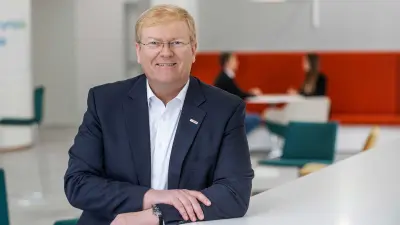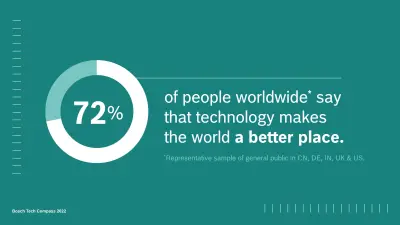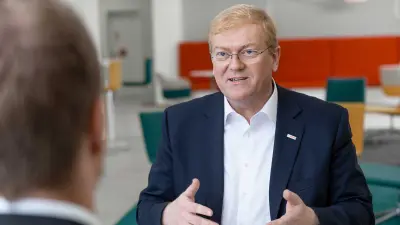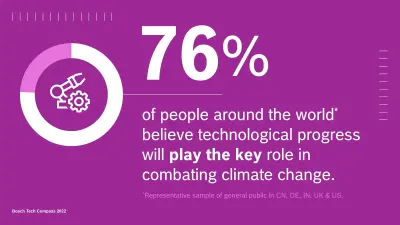風蕭蕭_Frank
以文會友技術是關鍵
https://www.bosch.com/stories/hartung-interview-technology-is-the-key/
對於博世董事長斯特凡·哈同博士來說,技術是應對氣候變化的關鍵
羅伯特·博世有限公司管理委員會主席 Stefan Hartung 博士的肖像。
自一月份以來,您一直負責德國最大的公司之一。 責任對你個人意味著什麽?
對我來說,責任首先涉及的是對我的行為負責的義務。 但除此之外,以我作為博世管理委員會主席的身份,這意味著確保采取一切必要措施來幫助我們實現目標。 我們公司創始人羅伯特·博世給我們留下了明確的指導,告訴我們這些目標是什麽:維護我們的獨立性,確保公司強勁而有意義的發展,並利用博世技術改善人們的生活。
擁有工程學博士學位,你可能會以與律師或經濟學家不同的方式看待很多事情。 當領導像博世這樣的公司時,這種技術視角有用嗎?
最重要的是,我成為一名工程師的原因是因為我對技術和創造技術的人著迷,而不是因為我決定有一天要經營一家公司。 但我在這裏經營一家公司。 這讓我有機會將我對技術的熱情運用到高科技公司的重要領域。 通過這種方式,我可以查明和評估技術趨勢和潛力,並與我的管理團隊一起決定公司是否進入新業務。 在這種情況下,接受過工程師培訓肯定會有所幫助。
全球 72% 的人*表示技術讓世界變得更美好。 *中國、德國、印度、英國和美國公眾的代表性樣本。
技術如何幫助德國實現巴黎氣候目標?
隻有借助創新技術,我們才能實現巴黎氣候目標。 我並不是唯一一個這樣看待事情的人。 在我們的“科技指南針”調查中,全球四分之三的受訪者表示,技術是應對氣候變化的關鍵。 更重要的是,我絕對確信我們還沒有發明出邁向淨零排放所需的所有技術解決方案。 還有更多的事情需要發生——作為一個樂觀主義者,我相信還會有更多的事情發生。
我觀察到社會責任如何成為當今許多公司的固定組成部分。
Stefan Hartung,羅伯特·博世有限公司管理委員會主席
博世以其社會承諾而聞名。 這種承諾是家族企業的典型特征嗎?
嗯,在德國經濟中——過去和現在——確實有很多有責任心的家族企業的例子。 對於羅伯特·博世來說,社會正義和社會凝聚力是重要的關注點。 作為一家公司,我們通過羅伯特·博世基金會,本著他的精神繼續這一承諾。 但我觀察到社會責任如何成為當今許多公司的固定組成部分——無論它們的法律結構和組織方式如何。
博世內部正在采取哪些措施來應對當今時代的挑戰?
我們這個時代最大的挑戰是氣候變化。 它讓我們沒有猶豫或拖延的餘地。 博世在這方麵發揮著主導作用。 自 2020 年 2 月以來,這表明跨國企業的製造業務可以在全球範圍內實現碳中和。 我們正在將我們的經驗傳遞給其他想要追隨我們腳步的公司。 與此同時,我們的產品也有助於實現更可持續的生活方式。
您的公司宣稱是“為生活而發明”,並且您的產品可以在其他公司生產的許多其他產品中找到。 這是否意味著特殊的責任? 畢竟,在可持續發展方麵,您可以施加的影響力是巨大的。
可持續發展是每個人和每個機構的責任。 隻有當我們將其視為全世界整個社會的一項任務時,我們才有機會。 我們意識到我們在博世所承擔的責任——也是其他人的先驅和榜樣。 我們在這裏兌現我們的承諾。
接受新的和未知的事物,接受它們,並積極地不斷學習,這一點至關重要。
Stefan Hartung,羅伯特·博世有限公司管理委員會主席
員工將麵臨哪些新挑戰?博世可以幫助他們嗎?
最重要的是,他們必須對變革保持開放態度。 我們生活的世界是複雜且不斷變化的。 一次又一次,這迫使我們作為一家公司適應新業務領域的出現、舊業務領域的徹底變化以及其他業務領域的完全半途而廢。 因此,對於我們的員工來說,至關重要的是,他們願意接受新的和未知的事物,接受它們,並積極不斷地學習。 幾年前,我們宣布博世是一個學習型組織,本著這種精神,我們提供了各種
終身學習的計劃和政策。 我們言出必行:在過去的五年裏,我們投資了 10 億歐元來重新培訓和進一步培訓我們的員工。
汽車行業是您最重要的行業之一。 博世可以采取哪些措施來使未來的出行更加可持續?
博世可以做的事情之一就是保持真正的技術中立。 我們為每種應用提供正確的解決方案。 例如,在我們的動力總成部門,這意味著我們不僅大力投資電動汽車,而且還在改進和磨練經典內燃機的組件。 未來幾十年仍然需要這些技術,為了緩解全球變暖和保護環境,它們必須反複升級到最先進的水平。
羅伯特·博世有限公司管理委員會主席 Stefan Hartung 博士接受采訪。
鑒於氣候中和的重要性,您認為電動動力總成是汽車行業未來的正確解決方案嗎?
嗯,是的,也不是。 這總是取決於具體情況。 在歐洲,如果我們設法加快基礎設施的建設,包括充電站和加氫站,並提供綠色電力和氫氣,那麽這裏選擇的動力係統顯然將是電動的,包括電池和燃料電池 。 在非洲、南美洲和亞洲部分地區,情況則截然不同,而且這種情況將持續多年。 在許多情況下,這些地區根本不具備電動汽車所需的基礎設施。 因此,我們將繼續需要這些地區的內燃機——使用碳中性燃料的高效發動機。 此外,此類燃料還可用於現有機隊,並使空運和海運實現氣候中性。
如何以氣候中和的方式提供這麽多電動汽車所需的能源?
不僅汽車需要能源,工業和私人家庭也需要能源。 所有這些都必須提供氣候中性的能源。 未來,這隻能通過進口能源來實現。 我們將進口綠色氫,而不是石油和天然氣等化石燃料。 好消息是,世界上有些地區日照時間長,為生產綠色氫提供了理想的條件。 我們現有的天然氣管網是分配天然氣的理想選擇。 也就是說,我們現在必須做很多事情來建立供應鏈。
76% 的受訪者*認為技術進步將在應對氣候變化方麵發揮關鍵作用。 *中國、德國、印度、英國和美國公眾的代表性樣本。
博世目前正在開展哪些技術創新(可能是開創性的創新)?
一項創新是否具有開創性,一般隻能在事後回顧時才能正確判斷。 但無論如何,博世的創新清單很長。 我們的電子防滑係統 ESP 迄今已挽救了約 15,000 條生命,博世製造微機電傳感器的工藝,以及我們在大流行開始時僅用六周時間開發的冠狀病毒快速 PCR 測試。 這些隻是幾個例子。 每年,我們在研發上花費數十億歐元。 如果我看看我們在軟件和人工智能方麵取得的進展,那麽我可以向你保證這個列表將會變得更長。
這篇采訪的德文版首次發表在 Magazin des F.A.Z.-Instituts 上。
Technology is the key
https://www.bosch.com/stories/hartung-interview-technology-is-the-key/
For the Bosch chairman Dr. Stefan Hartung, technology is the key to combating climate change

Since January, you've been in charge of one of Germany’s biggest companies. What does responsibility mean for you personally?
For me, the first thing responsibility involves is the obligation to answer for my actions. But beyond that, in my capacity as chairman of the Bosch board of management, it means ensuring that everything necessary is done to help us achieve our objectives. Our company founder Robert Bosch left us with clear guidance as to what those objectives are: safeguarding our independence, ensuring the company’s strong and meaningful development, and using Bosch technology to improve people’s lives.
With a doctorate in engineering, you perhaps see a lot of things differently from a lawyer or an economist. Is such a technological perspective useful when leading a company like Bosch?
More than anything else, the reason I became an engineer was because I’m fascinated by technology and the people who create it, and not because I decided I wanted to run a company one day. But here I am, running a company. And that gives me the chance to apply my enthusiasm for technology where it matters, in a high-tech company. In this way, I can pinpoint and evaluate technological trends and potential, and decide together with my board of management team whether the company will enter a new business or not. And in such cases, it certainly helps to have trained as an engineer.

How can technology help Germany achieve the Paris climate targets?
It’s only with the help of innovative technology that we will achieve the Paris climate targets. And I’m not the only person to see things that way. Three out of four of the people we polled worldwide in our Tech Compass survey said that technology is the key to combating climate change. What’s more, I’m absolutely sure that we have by no means invented all the technological solutions we will need as we move toward net zero. A lot more needs to come — and as an optimist, I’m sure a lot more will come.
I’ve observed how social responsibility has become a fixture of many of today’s companies.
Stefan Hartung, chairman of the board of management, Robert Bosch GmbH
What is Bosch doing in-house to tackle the challenges of our age?
The greatest challenge of our age is climate change. It leaves us no room for hesitancy or procrastination. Bosch is playing a leading role here. Since February 2020, it has shown that a multinational enterprise’s manufacturing operations can be carbon neutral — worldwide. We are passing on our experience to other companies that want to follow in our footsteps. At the same time, our products are also helping enable a more sustainable way of life.
Your corporate claim is “Invented for life,” and your products can be found in many other products made by other companies. Does that mean a special responsibility? After all, when it comes to sustainability, the amount of leverage you can apply is enormous.
Sustainability is the responsibility of every single person and institution. And only if we see it as a task for the whole of society, worldwide, will we have any kind of chance. We are aware of the responsibility we bear at Bosch – also as a pioneer and role model for others. We are honoring our commitment here.
It’s crucially important to accept things that are new and unknown, take them on board, and actively keep learning.
Stefan Hartung, chairman of the board of management, Robert Bosch GmbH
Above all, they will have to remain open for change. The world we live in is complex and in flux. Again and again, this forces us as a company to adapt as new areas of business come into being, old ones change radically, and others fall by the wayside completely. So for our associates, it’s crucially important that they be willing to accept things that are new and unknown, take them on board, and actively keep learning. Some years ago, we declared Bosch a learning organization, and in this spirit we offer a variety of programs and policies for lifelong learning. And we put our money where our mouth is: over the past five years, we have invested a billion euros in reskilling and further training our workforce.
The automotive industry is one of the most important sectors for you. What can Bosch do there to make future mobility more sustainable?
One of things Bosch can do is to remain truly technology neutral. We have the right solution for every application. In our powertrain division, for example, this means we aren’t just investing heavily in electromobility, we’re also refining and honing our components for classic combustion engines. These will still be needed for many decades to come, and to mitigate global warming and protect the environment they will repeatedly have to be brought up to the state of the art.

Given the primacy of climate neutrality, do you think the electrical powertrain is the right solution for the future of the automotive industry?
Well, yes and no. It always depends on circumstances. Here in Europe, if we manage to speed up the build-out of infrastructure, with charge spots and hydrogen filling stations, and to make green electricity and hydrogen available, then the powertrain of choice here will obviously be electrical, with batteries and fuel cells. In Africa, South America, and parts of Asia, the situation is a quite different one, and will remain so for years. In many cases, these regions simply do not have the infrastructure needed for electromobility. So we will continue to need combustion engines for these regions — highly efficient engines that run on carbon-neutral fuels. Moreover, such fuels can also be used in the existing fleet, and make air and sea transport climate neutral.
How can the energy needed for so many electric cars be made available in a climate-neutral way?
It’s not just vehicles that need energy, but industry and private households as well. All of them have to be supplied with climate-neutral energy. In the future, that will only work by importing energy. Instead of fossil fuels like oil and gas, we will import green hydrogen. The good thing is that there are regions in the world whose long hours of sunshine give them ideal conditions for producing green hydrogen. And the gas grids we already have are ideal for distributing it. That said, we now have to do a lot to set up supply chains.

What technical innovations — possibly pioneering ones — is Bosch working on at the moment?
Whether or not an innovation is pioneering can generally only be judged properly in retrospect. But whatever the case, the list of Bosch innovations is long. There’s our electronic anti-skid system ESP which has saved some 15,000 lives so far, the Bosch process for manufacturing microelectromechanical sensors, and the rapid PCR test for coronavirus that we developed in just six weeks at the start of the pandemic. And those are just a few examples. Every year, we spend several billion euros on research and development. And if I look at the progress we’re making in software and artificial intelligence, then I can promise you that the list is about to get a lot longer.
This interview was first published in German in Magazin des F.A.Z.-Instituts.




